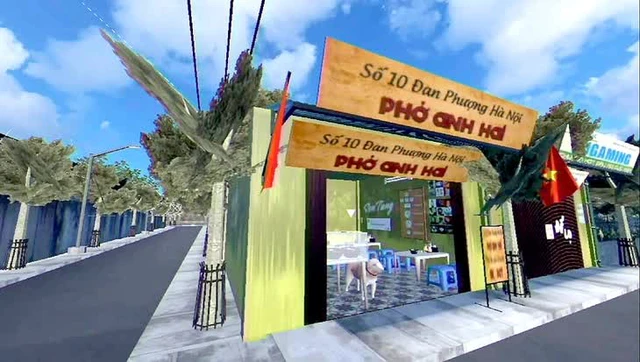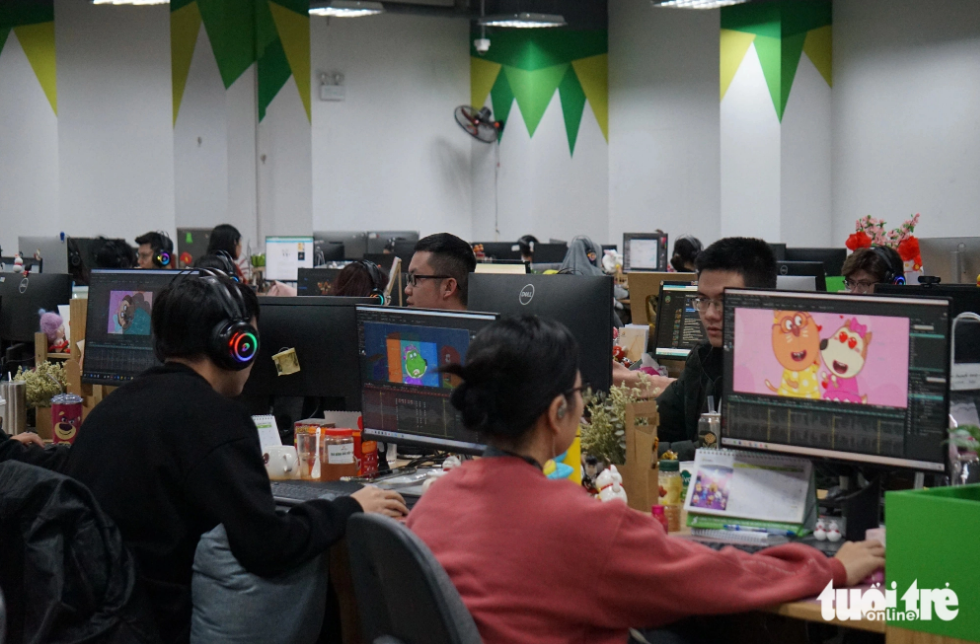
Viral indie gaming hit exposes holes in Vietnam’s creative industry
Editor’s note: In this piece contributed to Tuoi Tre (Youth) newspaper, Tran Xuan Tien, M.A., deputy dean of the Department of Communications at Van Hien University in Ho Chi Minh City, looks at the recently unexpected rise of an indie game and what its success — and the challenges faced by its anonymous creator — reveals about the state of Vietnam’s creative and gaming industries.

A scene from the Vietnamese indie video game Brother Hai’s Pho Restaurant. Screenshot
The commentary was translated from Vietnamese and edited by Tuoi Tre News for clarity and coherence.
In early November, a game name that sounded both familiar and strange suddenly lit up Vietnamese social media: Brother Hai’s Pho Restaurant.
It is a simple game: rustic graphics, easy mechanics, and a calm pace.
Yet within days, hundreds of thousands of players were hooked, eagerly exploring its small, pixelated world and sharing their delight online.
The surprise was not just the game’s charm, but its creator.
Behind the viral hit was a final-year student at the Hanoi University of Science and Technology, known only by the alias Marisa0704.
Refusing to reveal his identity even in media interviews, he built the game entirely on Godot Engine, a free platform, and released it on itch.io, with no ads, no sponsorships, and no marketing budget.
Within a few days, the game had more than 650,000 downloads and millions of related video views.
Some fans even rode out to Dan Phuong, on the outskirts of Hanoi, hoping to find a real-life version of the fictional pho shop.
Beneath the game’s quiet surface — a story about a young man running a small pho stall, keeping a dog, and chatting with regulars — was a strange tension.
The game went viral overnight, but its creator chose to disappear into anonymity amid a media storm.
Online speculation grew over why Marisa0704 refused to step into the spotlight.
The situation inevitably recalls another case from 12 years ago, Flappy Bird.
That simple mobile game, created by Nguyen Ha Dong, stunned not only Vietnam’s gaming community but the world.
Dong famously built the game in just a few days, then woke up to find it sitting atop Apple’s App Store charts.
But fame came with crushing pressure.
Facing public scrutiny and rumors about copyright and taxes, Dong decided to remove the game from stores, retreating from the chaos.
So why do Vietnam’s gaming hits so often appear, and vanish, in isolation?
The answer seems less about individual talent, and more about the system around them.
Brother Hai’s Pho Restaurant resonated because of its deeply Vietnamese details: steaming bowls of pho, the whir of motorbikes, red plastic stools, and the chase after a dog thief. Every scene felt familiar, even nostalgic.
But fame came at a cost. Within days, dozens of fake APK (Android Package Kit) versions surfaced, some containing malware.
The developer quickly posted warnings.
Before he could even think about monetization or securing intellectual property rights, his creation was copied and exploited.
Once again, a Vietnamese developer found himself alone, trying to protect a passion project against forces far larger than himself.
Flappy Bird faced the same fate: a triumph turned burden.
Lacking legal and business support, Dong was left vulnerable to baseless allegations and overwhelming public attention.
Vietnam’s young developers have ideas and passion in abundance. What they lack are advisors, infrastructure, and protection.
Look at nearby countries — South Korea or Thailand — where governments and industries have built full creative ecosystems: training, legal guidance, funding, and protection.
Those nations appear on the world’s gaming map not because of one viral success, but because they built systems that sustain creators.
Brother Hai’s Pho Restaurant is, once again, a test of how Vietnam nurtures — or fails to nurture — its creative talent.
If we cannot protect a single indie developer from piracy, or help him commercialize his success, how can we talk about a creative economy? Without structure, the market produces only moments, not industries.
No nation has ever built a creative industry on inspiration alone.
For Vietnam’s gaming scene to grow sustainably, passion must evolve into structure including policy, infrastructure, funding, and protection.
We need a three-tier ecosystem:
Incubation — schools, tech communities, and competitions that let young people experiment and fail safely.
Development — creative investment funds, technical and legal guidance, and commercialization support.
Industry — strong intellectual property laws, tax incentives, and export strategies.
Only when these tiers work together can Vietnam’s game industry form a complete value chain — from idea to product, from individual to enterprise.
Then, each small pho shop or flapping bird will no longer be just a viral phenomenon but a brick in the foundation of a truly sustainable creative industry.
Tuoi Tre News
Link nội dung: https://news.tuoitre.vn/viral-indie-gaming-hit-exposes-holes-in-vietnams-creative-industry-103251110153805535.htm
